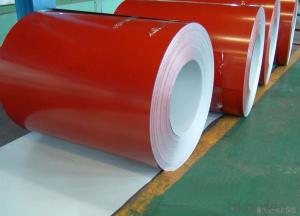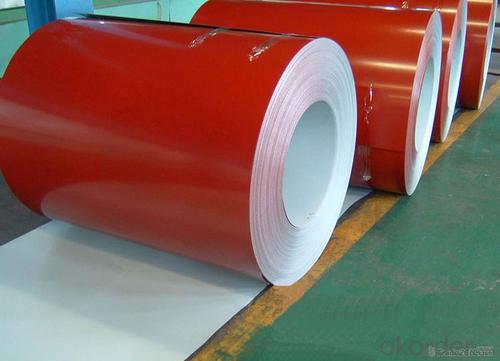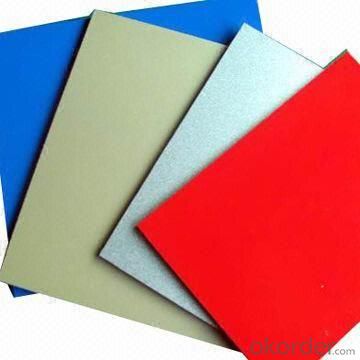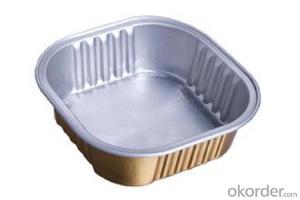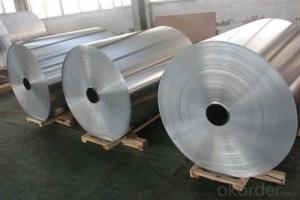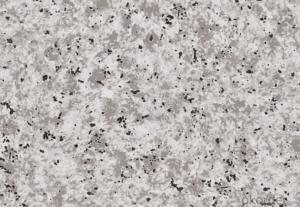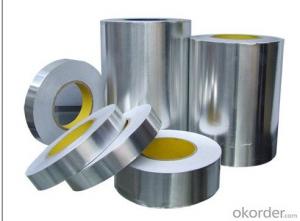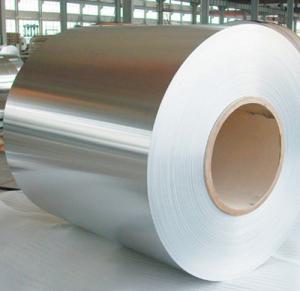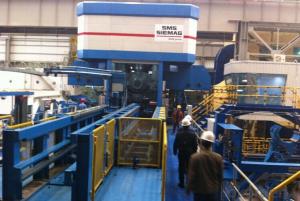Aluminum Foil Coil - Stone Power Coated Aluminum Coil
- Loading Port:
- Shanghai
- Payment Terms:
- TT OR LC
- Min Order Qty:
- 8 m.t.
- Supply Capability:
- 2000 m.t./month
OKorder Service Pledge
OKorder Financial Service
You Might Also Like
Specification
Structure of Aluminium Stone Power Coated in Coil Form:
Coated aluminum coil/sheet are of a wide range of colors, which gives wonderful appearance no matter in residential and commercial constructions of great exhibition centers.
The coated aluminum coil/sheet have been widely used in the fields of construction and decoration( garage doors, ceiling etc.), electronic appliances, lighting decoration, air-condition air pipes, sandwich panels and drainages etc.
Main Features of Aluminium Stone Power Coated in Coil Form:
1) High flexibility
2) Impact resistance
3) Excellent weather-proof durability
4) Anti-ultraviolet
5) High erosion resist
Images of the Aluminium Stone Power Coated in Coil Form:
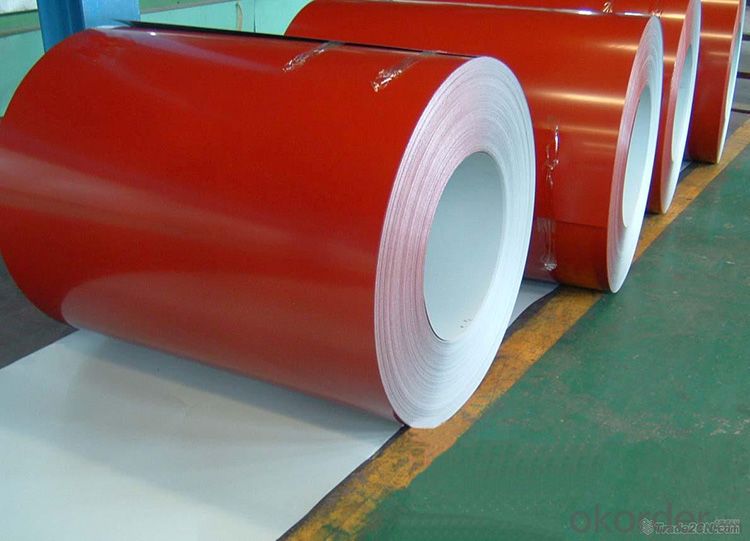
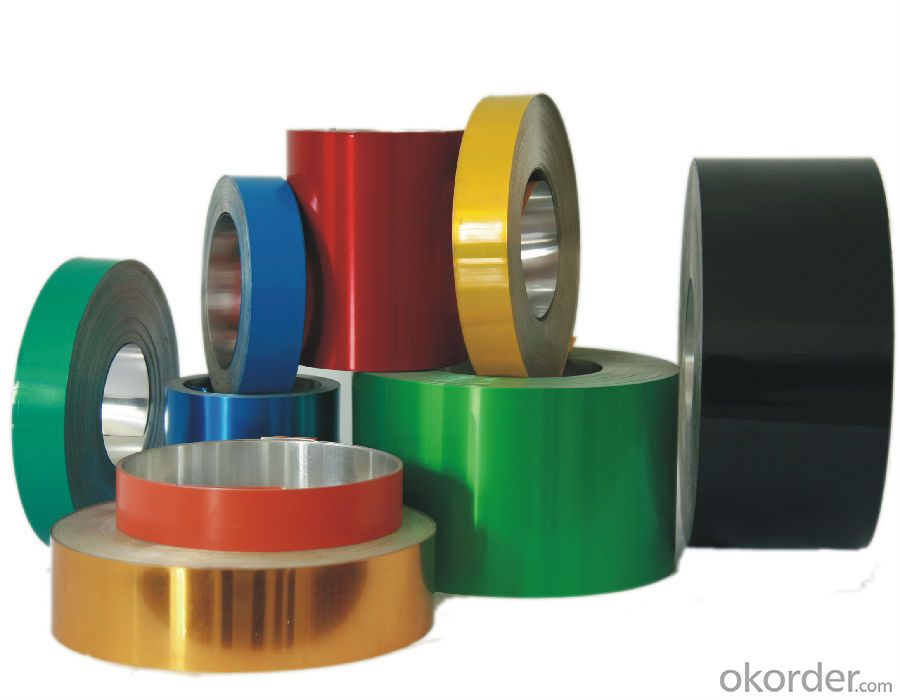
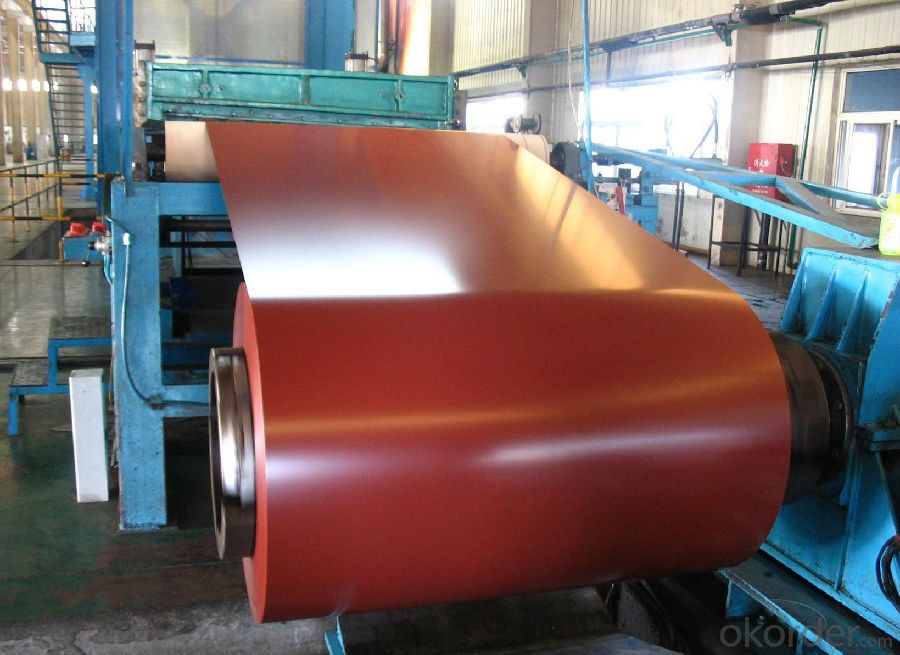
Aluminium Stone Power Coated in Coil Form Specification:
Alloy | A1100,A3003,A1050,A8011 etc |
Temper | H16,H18,H24 |
Thickness | From 0.024mm to 1.2mm |
Width | Standard width:1240mm |
Special width:1300mm,1520mm,1570mm,1595mm | |
Diameter | Standard dia:1200mm |
Interior dia:150mm,405mm,505mm | |
Weight | 2.5 T/coil,3.0 T/coil |
Coating | PE, PVDF, AC |
Surface | Embossed, mill finish, coated |
Color | AS to code RAL |
Gloss | 10-90%(EN ISO-2813:1994) |
Coating Thickness | PE: more than 18 micron |
PVDF: more than 25 micron | |
Coating Hardness (pencil resistance) | More than 2h |
Coating adhesion | 5J(EN ISO-2409:1994) |
Impact Resistance | No peeling or cracking(50 kg/cm,ASTMD-2794:1993) |
Flexibility (T-bend) | 2T |
MEK resistance | More than 100 |
FAQ Aluminium Stone Power Coated in Coil Form:
a.What is monthly capacity
---CNBM is one stated own company and our monthly capacity is about 2000tons.
b. Now which countries do you export your goods?
---Now we export to South East Asia,Africa, North America,South America ect.
- Q: How are aluminum coils used in the production of solar panels?
- Aluminum coils play a crucial role in the production of solar panels. These coils are typically used in the construction of the photovoltaic (PV) module, which is the core component responsible for converting sunlight into electricity. Firstly, aluminum coils are used as the primary material for the frame of the PV module. The frame provides structural support and protection to the delicate solar cells, ensuring they are secure and safe from external factors such as weather conditions or physical damage. Aluminum's lightweight yet sturdy nature makes it an ideal choice for this purpose, as it offers durability without adding excessive weight to the overall structure. Secondly, aluminum coils are often used as the backsheet material in solar panels. The backsheet is a critical component that protects the solar cells from moisture, dust, and other environmental elements. It acts as a barrier, preventing any potential damage to the cells while also providing electrical insulation. Aluminum's excellent corrosion resistance and electrical conductivity make it an ideal material for this application. Furthermore, aluminum coils are used in the production of the interconnection system within the solar panel. This system consists of conducting wires that connect the individual solar cells, allowing the flow of electricity between them. Aluminum's high electrical conductivity ensures efficient transmission of the generated electricity, minimizing energy losses within the panel. In addition to these key roles, aluminum coils are also used in the manufacturing of various other components within solar panels, such as junction boxes, connectors, and mounting systems. These components contribute to the overall functionality and reliability of the solar panel. Overall, aluminum coils are extensively utilized in the production of solar panels due to their lightweight, durable, and corrosion-resistant properties. Their versatility and ability to withstand harsh environmental conditions make them an essential material for ensuring the longevity and efficiency of solar panel systems.
- Q: like i need a good slogan for aluminum its for a school project like for arsenic's is Arsenic's a sure fire way to deal with a rat, It works better than a mean old cat!
- Aluminum: Keeping stoners amazed for over 50 years!
- Q: What are the properties of aluminum coils?
- Aluminum coils are highly sought after in various industries due to their numerous key properties. Firstly, they possess a high strength-to-weight ratio, which means they are both lightweight and durable. This makes them ideal for industries like aerospace, where reducing weight is crucial. Furthermore, aluminum coils exhibit exceptional corrosion resistance. The formation of a thin oxide layer on the metal surface prevents further oxidation, making them suitable for outdoor and marine environments. This corrosion resistance also extends their lifespan, reducing maintenance costs. Another important property of aluminum coils is their high thermal conductivity. This allows for efficient heat transfer, making them well-suited for applications in the HVAC industry. Additionally, they have excellent electrical conductivity, making them favorable for use in electrical and electronic components. Aluminum coils are also highly malleable and ductile, allowing for easy shaping and forming. This versatility makes them popular in manufacturing processes, such as the production of automobile parts, cans, and packaging materials. Lastly, aluminum coils are known for their recyclability. They can be easily melted down and reused without compromising their quality, making them an environmentally friendly choice. This aligns with the increasing focus on sustainability and reducing the environmental impact of industries. In conclusion, aluminum coils possess valuable properties such as high strength-to-weight ratio, corrosion resistance, thermal and electrical conductivity, malleability, and recyclability. These properties make them valuable in numerous applications across various industries.
- Q: Explain how aluminum coils are connected to electronics.
- <p>Aluminum coils play a significant role in the electronics industry due to their high electrical conductivity and low density. They are used in various components such as transformers, inductors, and chokes, where they help in the conversion and regulation of electrical energy. Aluminum's non-magnetic properties make it ideal for parts that need to be shielded from magnetic fields. Additionally, aluminum coils are used in heat sinks to dissipate heat generated by electronic devices, ensuring their efficient operation and longevity.</p>
- Q: How do aluminum coils contribute to thermal insulation?
- Aluminum coils contribute to thermal insulation in several ways. Firstly, aluminum is a highly reflective material, meaning it can reflect heat and radiation away from the surface. This property helps to reduce the amount of heat that is absorbed by the coil and transferred to the surrounding environment. Additionally, aluminum coils are often used in conjunction with insulation materials such as foam or fiberglass. These insulating materials help to trap air pockets, which act as a barrier to heat transfer. The aluminum coil serves as a protective layer, preventing the insulation material from being damaged or compromised. Furthermore, aluminum is a lightweight material with excellent corrosion resistance. This allows aluminum coils to be used in various applications, including HVAC systems, where they can help to maintain a consistent temperature by minimizing heat loss or gain. Overall, aluminum coils play a vital role in thermal insulation by reflecting heat, protecting insulation materials, and providing durability and longevity to the insulation system.
- Q: Can the 5-10cm thick paper sleeve inside the scrapped aluminum coil be sliced? Now we use knife which is much troublesome.
- You can use Long Men Rolling Mill to slice directly.
- Q: I live around Minneapolis, MN. Is there a place that you can recycle crushed aluminum cans for money around here?
- there are lots of benefits you must google it
- Q: How do aluminum coils compare to other metal coils like steel or copper?
- When comparing aluminum coils to steel or copper coils, there are several advantages and disadvantages to consider. In terms of weight, aluminum coils are significantly lighter than steel coils. This makes them easier to handle and transport, resulting in potential cost savings for the manufacturing and construction industries. On the other hand, steel coils offer superior strength and durability, making them more suitable for heavy-duty applications where strength is crucial. When it comes to corrosion resistance, aluminum coils have a natural oxide layer that protects them from rust and corrosion. This makes them an excellent choice for outdoor applications or environments with high humidity. While copper coils also have excellent corrosion resistance, steel coils are more susceptible to rust and require additional protective coatings. Thermal conductivity is another important factor to consider. Copper is well-known for its exceptional thermal conductivity, making it highly efficient for applications that require heat transfer, such as HVAC systems. Although aluminum coils have lower thermal conductivity than copper, they are still widely used in various heat transfer applications due to their lightweight nature and cost-effectiveness. Cost is a significant consideration when comparing different metal coils. Generally, aluminum coils are more affordable than copper and steel coils, making them a popular choice in many industries. However, for heavy-duty applications, steel coils often provide the most cost-effective option due to their superior strength and durability. Ultimately, the choice between aluminum, steel, or copper coils depends on the specific requirements of the application. Each metal possesses its own unique properties and advantages, and selecting the appropriate material involves considering factors such as weight, strength, corrosion resistance, thermal conductivity, and cost.
- Q: Are aluminum coils suitable for interior design applications?
- Aluminum coils are indeed a fitting choice for interior design purposes. The versatility of aluminum as a material presents a multitude of advantages for interior design endeavors. To begin with, aluminum possesses a lightweight nature, ensuring ease of handling and installation. This quality proves particularly advantageous for projects necessitating extensive installations or suspended ceilings. Moreover, aluminum coils exhibit exceptional durability and corrosion resistance, guaranteeing extended lifespan and suitability for high-traffic regions. Furthermore, aluminum can be effortlessly tailored and molded to meet specific design requirements, thereby offering limitless design possibilities. Additionally, the material is available in a plethora of finishes, including brushed, polished, or anodized options, which can significantly enhance the aesthetic allure of any interior space. Furthermore, aluminum emerges as a sustainable and eco-friendly alternative, given its easy recyclability and low carbon footprint relative to other materials. All in all, aluminum coils represent a pragmatic and visually pleasing choice for interior design applications.
- Q: How would our life on planet earth be modified if there was no aluminum at all? Examples welcomed.
- It would pretty much be the same. Although aluminum is a very useful metal, if it were non-existent, we would simply use other metals or plastics. Plastic is just as infinitely recyclable as aluminum and lighter. Copper, tin, and magnesium (or an alloy of these) could be substitute for aluminum in certain applications. Then there are all these new composite materials being developed, some of which are lighter and stronger then most metals, including aluminum.
Send your message to us
Aluminum Foil Coil - Stone Power Coated Aluminum Coil
- Loading Port:
- Shanghai
- Payment Terms:
- TT OR LC
- Min Order Qty:
- 8 m.t.
- Supply Capability:
- 2000 m.t./month
OKorder Service Pledge
OKorder Financial Service
Similar products
Hot products
Hot Searches
Related keywords
